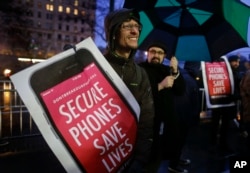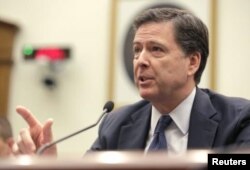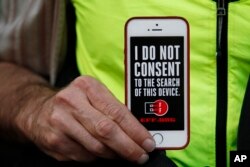The recent announcement by mobile messaging service WhatsApp that it would begin offering end-to-end encryption made worldwide headlines. That's no surprise, given the app has approximately 1 billion users across the globe.
What was surprising, and mostly unnoticed, was the role the U.S. government ultimately played in making that happen, as well as the often messy ways different parts of the same government can be seen as working at cross-purposes.
WhatsApp encryption uses a protocol known as Signal, originally developed for a stand-alone encryption app by Open Whisper Systems. The head of Open Whisper Systems, the pseudonymous "Moxie Marlinspike," worked to build a strong, shielded communication application. But sometime around 2012, funds began to dry up.
Enter the Open Technology Fund, or OTF. It's a publicly funded incubator of digital security systems run by Radio Free Asia (a sister broadcaster of VOA; both are overseen by the Broadcasting Board of Governors, which operates its own anti-censorship and web circumvention efforts). OTF quickly saw the uses of Signal for journalists, human rights activists and others living under authoritarian rule.
In 2013, OTF gave $455,000 to Marlinspike and Open Whisper Systems; later, in both 2014 and 2015, it funded Open Whisper with $900,000 each year, leading to a total of $2,255,000.
"Clearly, Open Whisper Systems was a success," said Rohit Majahan, Radio Free Asia's head of public affairs. "It's very important for journalists and their sources, protecting the people they're talking to, as well as Internet rights advocates, human rights defenders and dissidents in countries around the world."
So what's surprising about that? OTF's participation in helping build and distribute encryption tools like Signal came at the same time other parts of the U.S. government — notably the FBI — began actively warning that the spread of unbreakable encryption threatens to take U.S. national security into "a very dark place."
‘Unfree’ places
The Open Technology Fund was founded in 2012 with funds provided by Congress to advance human rights and free expression on the Internet in "unfree" places around the world. This includes China, Iran, Sudan and many other nations ruled by authoritarian regimes.
With an approximate average yearly budget around $8,000,000, the OTF supports " … Internet freedom projects that empower world citizens to have access to modern communication channels that are free of restrictions and allow them to communicate without fear of repressive censorship or surveillance," according to its website.
Since its founding, the OTF has supported dozens of projects. Some, such as the Qubes operating system, are relatively unknown outside the cyber community, while others, like Tor, are used by untold thousands every day.
The projects cover many different areas of privacy and security: In addition to encryption applications, OTF helps support anonymization, circumvention and other technologies.
"WhatsApp, for example, is used to protect people's free speech in Sudan and Hong Kong," Majahan told VOA. "Refugees from Syria and North Africa use it when they travel to shield communications. It's important for reporters who report on crime and corruption, protecting them in places like India. And it's also used by women who are often targeted with malicious attacks and harassment."
There is growing debate in Washington over the appropriate uses and limits of encryption. It began in earnest two years ago when FBI Director James Comey first warned that spreading encryption on smartphones was "harmful" to law enforcement.
"If the challenges of real-time interception threaten to leave us in the dark, encryption threatens to lead all of us to a very dark place," Comey warned.
The debate moved center stage recently when the FBI went to court to press Apple to help unlock a smartphone allegedly used by San Bernardino terrorist Syed Farook. While that case was dismissed after a hacker successfully found a way around the phone's security features, the Department of Justice continues to press tech firms like Apple to help gain access to encrypted devices.
Regarding that debate, Majahan agrees that "encryption is really a wide-reaching issue that affects people's lives in so many ways." But, he says, it's not one that the OTF is actively engaged in because of its more narrow aims.
"Our focus is on uses in oppressive places with authoritarian governments that harshly punish people offline for their online activities,” he said. “This includes human rights defenders and activists, dissidents, LBGT or persecuted minorities — just at-risk users in these places."
Debate heats up
Just as Apple has found support within Silicon Valley for championing unlimited encryption, it's also found critics in Washington who agree that the government sometimes needs to compel companies to help break their encryption.
"Apple chose to protect a dead ISIS terrorist's privacy over the security of the American people," said Senator Tom Cotton, an Arkansas Republican, in a February statement. More recently, Cotton said that WhatsApp's adoption of Signal " … continues a dangerous trend in the tech and data world."
"I probably fall on the side of law enforcement," Representative Trey Gowdy, a North Carolina Republican, told Fox Business Channel, "because there's a public safety exception for the Fourth Amendment, the Fifth Amendment, [and] national defense."
Even Republican presidential hopefuls Donald Trump and Ohio Governor John Kasich issued statements of support for the FBI. "Who do they think they are?" Trump wondered aloud on Fox News, referring to Apple CEO Tim Cook.
Just last week, in a leaked draft of a proposed encryption bill, the authors made clear that tech companies, app developers and even possibly individuals would be legally required to essentially break their own encryption upon court order.
For its part, the White House has walked a finer line, supporting the FBI and Department of Justice in their efforts, but generally turning a cold shoulder to congressional efforts to limit or refine encryption standards.
What's clear is that as the encryption debate moves out of the cyber shadows and into the mainstream, various interests inside the U.S. government will continue to argue for their side — even if those arguments are in competition with other parts of the federal bureaucracy.
And while no one agency wants to be seen as picking fights with any other part of the federal government, as that debate intensifies, some conflicts may be inevitable.
For his part, RFA's Majahan says simply that "we try to stay out of the larger debate and just focus on our job — that's finding the people who have the ideas and solutions for a specific use in furthering our mission."
In a postscript, the irony of one arm of the U.S. government working to expand the use of encryption while another seeks to slow its spread may be made only a little more ironic that a third arm of the U.S. government — the Voice of America — winds up reporting on the conflict between the other two.








